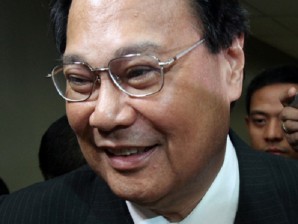MANILA, Philippines—A survey conducted from Feb. 24 to 28 at the University of the Philippines in Diliman, Quezon City, shows that Chief Justice Renato Corona no longer enjoys the trust of many of the state university’s students.
The results of the survey conducted by the UP Paralegal Society, a copy of which was obtained by the Inquirer on Tuesday, showed that 74 percent of students surveyed in the UP Diliman campus answered “none” when asked this question: “Do you still trust Chief Justice Renato Corona?”
However, Corona still enjoyed the trust of 26 percent of those surveyed.
Majority of the respondents also judged Corona to be unfit to remain on the Supreme Court—75 percent of the respondents answered “no” to the question: “Does Mr. Renato Corona deserve to remain as Chief Justice?” Twenty-fiver percent answered “yes.”
The UP Paralegal Society is a student organization providing free legal services and review classes for undergraduate students.
The Paralegal Society handed out a questionnaire to students taking classes at Palma Hall, which houses the College of Social Sciences and Philosophy (CSSP), and students from three other colleges at the Diliman campus—National College of Public Administration and Governance (NCPAG), College of Social Work and Community Development (CSWCD) and School of Economics.
A questionnaire was also posted via “Google Talk,” an online instant messaging service that provides both text and voice communication. The survey used random sampling.
All 504 “responses” were returned to the student group when the survey ended at 3:22 a.m. Tuesday.
The third question allowed respondents to give “suggestions” to senator-judges as they resolve the impeachment case.
The prevailing sentiment was for senator-judges to rule on the impeachment complaint based on the “merits and evidence,” and to “avoid outside influences,” Jules Guiang, chair of the NCPAG Student Government and an officer of Paralegal Society, told the Inquirer in an interview.
Guiang said that the goal of the survey was to “know the sentiments of the UP Diliman student body” in relation to the ongoing impeachment trial of Corona.
When asked about the implications of the results of the survey, Guiang said: “It appears that the prosecution has been effective in prosecuting Corona.”
The student leader also pointed to the “triumph of moral and ethical grounds” over legal technicalities despite the plethora of highly skilled defense counsels of the Chief Justice.
In the same vein, he also, cited the “significant number of (students) who still trust” the chief justice.
“He did not get a zero, (thus) recognizing the capability of Chief Justice Corona,” said Guiang.
Guiang, Markus San Gabriel, who sits on the UP Diliman Student Council as representative of the CSWCD, and Kehrl Reyes, chair of the Economics Student Council, initiated the survey.
On Monday, Sen. Miriam Defensor-Santiago preempted the release of the survey data by questioning the timing of the survey. She called the survey “propaganda” and an “insult to the intelligence of Filipinos.”
“And what is the implication, that this matter can be resolved through a referendum? What if Ateneo (de Manila University) conducts its survey, too, as against the UP survey, what will we do?” said Santiago.
Sought for comment, Guiang retorted: “We only want to know the pulse of the studentry. What’s wrong with it?”
As to the rationale for the questions, Guiang said they were grounded on “moral-ethical bases,” and thus it was asked whether Corona had the “trust” of the people and still “worthy of the position.”
Guiang said that as students of UP—once a bastion of student activism—they would not condone any attempt to be influenced either by the prosecution and the defense, or the Aquino administration.
What the students conducted, he said, was a “random survey and not a referendum,” and neither was the survey an insult to “the Filipinos and the UP students; rather we even see it as another step to ignite the relevance of an Iskolar ng Bayan (state scholar) that truly cares about the prevailing issues whether we are directly or indirectly affected.”
He said the survey was “neutral and independent.”
“In this time that the President of the Philippines and the Chief Justice try to influence the decisions of senator-judges, it is about time that the voice of the students would also be heard by senators, to strike a balance between the influential motives of the President and the Chief Justice,” said Guiang.
Guiang maintained that the survey was grounded on a “legitimate purpose… because it is the right of any student-leaders to conduct a survey to know the pulse of the students on a certain issue. It follows a legitimate process as the survey will not be leading towards a certain stand.”
The survey also promoted good governance within the student body by asserting participation of the students “in the heat of the issue of the impeachment trial,” said Guiang, who was the convenor of the 2012 National Congress on Good Governance held at UP last month, which was attended by student leaders from all over the country.
The group would still conduct another survey once the defense starts presenting its rebuttal.
“The results of the first phase survey will reflect the opinions/take of the students regarding the impact/effectiveness of the trial… during the period of the prosecution. This second phase (of the survey) basically aims to serve as an analysis whether the students would change their views or be firm with their stand during the first phase,” said Guiang.
Originally posted: 6:23 pm | Tuesday, February 28th, 2012
